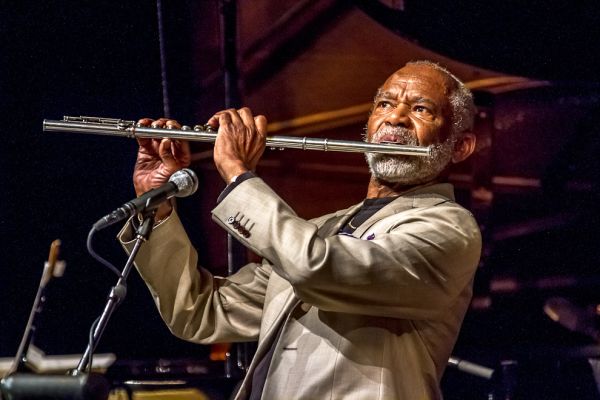Home > Jazz / Blues
02/27/2023
Hubert Laws and Brian Jackson 2023 Biamp PDX Jazz Festival at the Newmark Theater 2/25/23. Review
By MICHAEL "SHOEHORN" CONLEY // Hubert Laws is one of the more famous flute players in jazz, who also established himself in the classical music world early in his career. His tone and articulation are flawless; he rips up and down the flute’s keys double and triple-tonguing, with rich dynamics and a great sense of musical line and melody.
The show was opened by Brian Jackson, a keyboardist, flute player, vocalist, and composer who worked with the late Gil Scott-Heron, the hip, soul-drenched proto-rap poet, in the 1970s. Jackson presented some of their well-known numbers, including “Winter in America” and “The Bottle”. Written 50 years ago, these songs, along with “The Revolution Will Not Be Televised” brought a socially conscious lyrical content often associated with folk and rock acts of the era to a funky, grooving urban sound with a cool, unambiguously Black perspective
It was a perspective embraced by the “counterculture” of the day– hippies, students, and ordinary people fed up with the war in Vietnam (and the draft), social ills, racism, political assassinations, and the poverty and injustice all around them. Like “Compared to What”, Gene McDaniel’s litany of American hypocrisy as sung by Les McAnn, the music of Gil Scott-Heron and Brian Jackson was thoughtful, provocative, and packed its punch with a great beat.
While it would be impossible for Jackson to fully embody the singular baritone and dramatic delivery of Gil Scott-Heron, as his collaborator on some of Scott-Heron's best work, he put the compeling messages across authoritatively with his own singing. Introducing “Winter in America” with an anecdote about a young fan who had asked him "How did you guys know back then? How did you know it would be like this?”, Jackson related that the question made him sad, adding “It didn't have to be this way” before launching into the song.
Jackson played the grand piano, electric piano, and sang, accompanied by an electric bassist, a drummer, and a percussionist. He did not play the flute at this show. The rest of the band performed in a tastefully understated, supportive style as the leader skillfully steered the music from the keyboards, and several tunes featured unexpected creative gambits in their ending sequences.
The percussionist, equipped with congas, bongos, and cajón, used his instruments in service of the arrangements in a manner reminiscent of the way a guitar or a horn player complements a singer. I've noted before that these instruments are played differently in Funk and R&B than they are in Latin bands or Afrobeat outfits. This creative player, whose name I didn’t catch, was very accomplished, with great tone on the skins, and he did a nice extended solo turn near the end of the concert.
Jackson’s drummer, Mark Whitfield, Jr, kept things simmering at a controlled temperature on a modern-sounding kit. I'm happy that this band is out there spreading the music and the message of Gil Scott-Heron, a true bard, or griot, as he was referred to by Jackson. This music boasts a highly danceable groove, and it was difficult to sit still!
The headliner, Hubert Laws, aged 83, took the stage with a quintet featuring grand piano at stage right, played by David Budway; John Leftwich on electric and upright basses; drummer Land Richards; and at stage left, Rob Mullins on a battery of electric keyboard instruments. Laws wore a narrow-brimmed hat, sunglasses, a white shirt, a zippered sweater vest, slacks, and comfortable shoes. He walked about the stage somewhat slowly, but was nimble as an elite athlete on his instruments.
Hubert Laws is one of the more famous flute players in jazz, who also established himself in the classical music world early in his career. His tone and articulation are flawless; he rips up and down the flute’s keys double and triple-tonguing, with rich dynamics and a great sense of musical line and melody.
Laws addressed the audience with an easy-going confidence that matched his skills on the flute perfectly, relating anecdotes about the songs to provide backstory.
Referencing a panel discussion moderated by Ashley Khan earlier in the day, he joked that “I didn't mean to come out here and talk too much”, though he appeared to enjoy talking about his collaborations and appearances with illustrious friends and colleagues, including saxophone colossus Sonny Rollins and the late pianist and composer Chick Corea.
He played Rollins's iconic “Airegin” on piccolo! Piccolo is a notoriously fickle instrument, and most musicians are all too familiar with its tendency for shrillness. Laws related to us some of the difficulties involved in playing the flute and piccolo, including the day-to-day physical challenges of keeping one's chops together.
It sounded to this writer like the piccolo should have been provided a separate microphone or at least a special mic setting for those numbers where it was featured, as its timbre overpowered the sound system during percussive, fortissimo spikes of volume, usually at the beginning of a phrase. Any sonic discomfort that may have been experienced by the crowd was offset by Laws’ astonishing command of the tiny woodwind. Overall, the sound was very well done and we could hear the nuances of Laws’ flute perfectly.
Unlike many jazz artists who might use another horn player, or a guitar or vibraphone soloist in a small group setting like this, Laws used the second keyboardist Mullins to expand the scope of the quintet and provide string and woodwind pads to replicate the orchestral sweep of his popular recordings. Mullins also got a chance to stretch as an improviser, referencing classic material such as a brief quote of “People Make the World Go ‘Round” in one solo.
The band played complex arrangements with a glossy EQ and some pop-like keyboard sounds suggestive of so-called smooth jazz, but Laws was doing this before anyone even called it smooth jazz, a term which does not do justice to this music. Along with the Rollins and Corea numbers, they played the hard bop classic “Dat Dere” by Bobby Timmons, which had a sort of Fife and Drum arrangement with drummer Land Richards in duet with Laws on piccolo. Richards did a playful and entertaining drum solo incorporating facial expressions in reaction to his own playing, breaking it down to simple melodic ideas before rebuilding the intensity and bringing the other players back in.
As a woodwind player who dabbles with the flute, I was rewarded and inspired by the artistry Hubert Laws brings to the instrument, and I feel listening to someone of his level of accomplishment expands my own horizons in music. Here was a man with a career going back over 60 years playing with robust bravado and commanding tone alternating with gentle and relaxed melodicism. Thank you to everyone at PDX Jazz for producing this concert.









Yugen
Thank you!